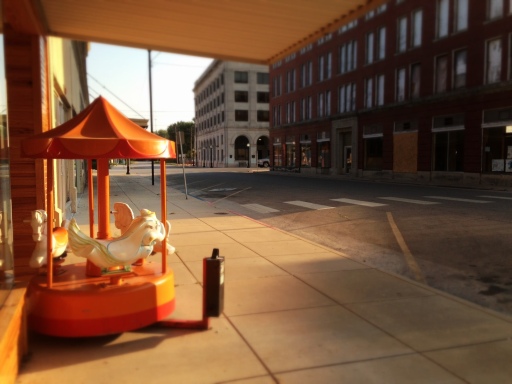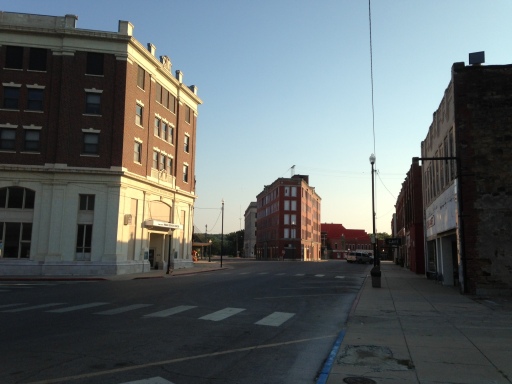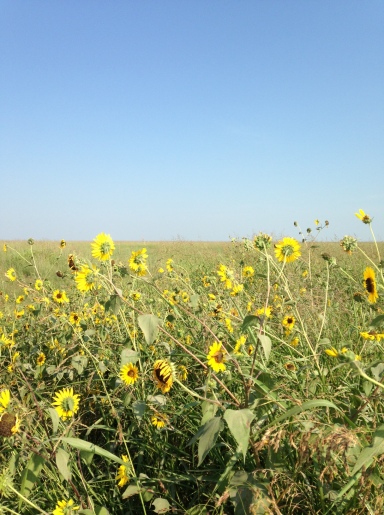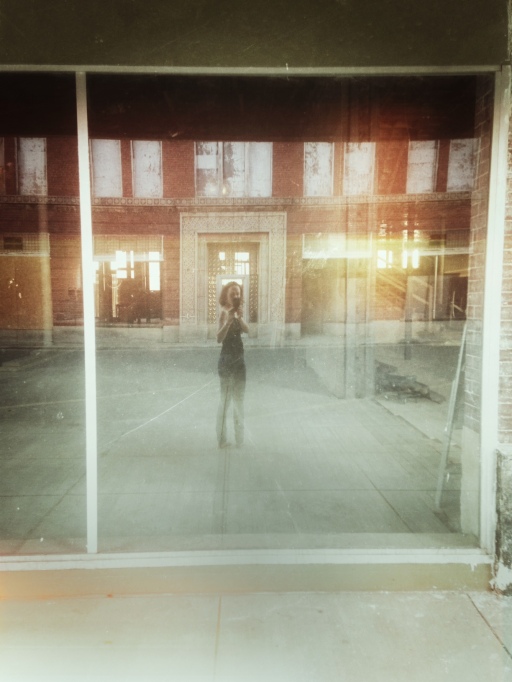“I got static in my head / the reflected sound of everything”
– Elliott Smith, Tomorrow Tomorrow
“It is an experience common to all men to find that, on any special occasion, such as the production of a magical effect for the first time in public, everything that can go wrong will go wrong.”
– Nevil Maskylene
The town of Pawhuska welcomed me in solemn solitude as I rolled along its streets, dust as thick as years billowing out from underneath my tires. Beautiful old buildings, whose heyday marked the advent of Jazz and change, now sit like shells on a forgotten beach, waves of silence crashing against their hollowed insides. Pawhuska, meaning “White Hair” in the Osage language, lies thirty-one miles southwest of Bartlesville. It is the heart of the Osage Nation, whose agency was established there in 1872. The highest census count of Pawhuska had the population at over 6,000 in the 1920s and ’30s, back when the Osage County oil boom was in full swing. Those were the meat years, maggoty meat years that sprouted from the bodies of murdered Osage families whose oil- and mineral-rich lands the encroaching white men wanted. These poignant parts of history are not mentioned much in Pawhuska– or Bartlesville, even though its own history is rife with white theft at the dawn of the black gold era. The population of Pawhuska has steadily declined since the ’30s. Now there are more empty store fronts than people on a Saturday evening.
It is early September, and the gray highways that led me alone to Pawhuska are long, curving, sleep-heavy limbs flanked by the pale teal shafts of Little Bluestem grasses topped with ivory down. Beyond those runs a bright yellow border of perky compass flowers at attention. The dueling purples of hyssop and agastache sprout gaily from dried, cracking ditches, between discarded Natural Ice six pack boxes and old cigarettes.
Horses hung their gleaming chestnut faces over the barbed wire and watched me as I drove by. When you are alone on a mostly empty highway, the world appears to expand infinitely. Like the sea, the natural landscape of the midwest holds possibility in its vastness. Late afternoon sunlight gilded the sloping hillsides, and in the presence of so much beauty, with the humid wind lashing my unbound hair against my face, I couldn’t hear my persistent loneliness or fears. The horizon kept me steady.
Before long, the highway T’d into a ribbon of bone-white dust. I found myself on a gravel road resting at the edge of a midwestern abyss: the prairie.
Pawhuska sits on the edge of what is left of the untouched great American prairie. Once part a 400,000 acre sea of waving grasses that ran from Canada to Mexico, it is now a protected 38,000 acre remnant called the Tallgrass Prairie Reserve. All around it, the farming and ranch lands– and even public recreation areas– of Oklahoma and Kansas are dotted with small pumpjacks like tall, robotic marsh birds, emitting the foul stench of unrefined oil. But there are none of those on the reserve. I came upon it by accident, while trying to outpace a feeling of intense discomfort in the house by hopping in the car, picking a highway, and driving down it. The need for escape so overwhelms me here that I regularly nearly book it for the Tulsa airport, before recalling that I don’t have the money or the guts to abandon everything before it has played out accordingly. I did not go to Tulsa today. Instead I drove to Somewhere Else until I arrived at the sea of grass. There I sat on the hood of my car, and watched the light play on the dancing bodies of grass and blossoms.
I have decided to leave. Recently I had a bad case of the break-downs and stopped sleeping because, according to the universal law of Murphy, that is the best way to process the emotions of defeat. I hadn’t known I was a participant in such a contest, but after being in Bartlesville for nearly two months, I realized the contest was with my own self. I was losing.
I had wanted so badly to make something of this trip, but here I am: jobless, friendless, and living in the house of a person with whom I appear to have a strongly opposing magnetic field. There isn’t much in the form of escape because the town of Bartlesville closes at two in the afternoon every day of the week– including Saturdays– save for a smattering of restaurants and bars. The nearest thing to an art gallery is a selection of sentimental, sloganized reproductions of landscapes shoved into a room. Additionally, the dogma is overwhelming at times. There are ninety-two listings for churches within a five mile radius of our house. Yet in the spirit of what seems to be true Christianity, there appears to be almost no resources for the socially outcast. A Universalist Unitarian church is down the block. I saw fliers for a domestic abuse shelter fundraiser that took place in 2011. But aside from that, there is nothing here but God.
It has defeated me, this godly oil town. I do not handle defeat well. Perhaps, because I very rarely seek or expect success, the moment I want it it becomes that much more unattainable. A few days prior to the mess I now find myself in, I had traveled alone along highway 75 into the cement heart of Dallas, Texas, to pick up a friend at the airport. Dallas is a globally recognized “Alpha world-city,” is home to Einsenhower’s birthplace and the frozen margarita, and is one of the hottest places in the United States. I had not intended to go to Dallas– or Texas, really– in my life, but it was not as bad as I predicted and it did not disappoint in size. Everything really is bigger in Texas, including the sun and its earth-cracking heat. The freeways are huge; the buildings are huge. I got lost in the huge airport that night. A sudden summer storm, coupled with poorly timed improvements to what appeared to be nothing, shut down half of the city’s major roads leading in and out of DFW, an airport with its own zipcode. For nearly two hours I drove in miles-long rectangles trying to locate my friend; when I did find her, it was midnight. Upon trying to return to our hotel room, the roads continued to bat us about like an evil kitten with its twine for over an hour.
But it was the drive to Dallas that broke the seal on my sanity. Five hours of undisturbed midwest is hard on me, especially with only my brain for company. A poor conversationalist, my brain opted to whisper evil-nothings into my frontal lobe for nearly all five hours. Everything I hated about my life presented itself like a crowd of Jehova’s Witnesses on the doorstep of my psyche. I found suddenly that I could not shake the feelings of despair upon driving back to Bartlesville, to face the awkwardness of not really belonging. The internal drip of anxiety began leeching into my entire being. I was paralyzed by a central nervous system that seemed to be suffering from the effects of a speed-like drug, and in my mind I resembled the cheek-chewing neighbors we always had in the poor neighborhoods of my youth. I was jittery, and babbled about nothing. After my friend and I arrived, everything between me and my temporary house mate fell apart. Communication. Understanding. Empathy. And on my end, the ability to eat. I couldn’t stop myself from unloading my anxiety on my boyfriend, whose presence in the house had been exponentially more well-received than my own from the beginning and thus made him a lightning rod for complaints. All of us began stalking the rooms like recently mutated enormous insects still concerned that our human counterparts were going to step on us. I was the one that shivered maniacally from the corner like a cockroach in a tub. I knew the water was coming, I just didn’t know when.
I tried to balance being a good hostess with my fancy new bodily behaviors. No sleep and lack of food hard wired me for burnout, I knew, but I plowed ahead. Escape came in the form of outdoor excursions in the hot and humid Oklahoma air. One such journey, a trip to a bizarre museum whose grounds housed bison and African animals, kept us transfixed for hours. The inside was a mishmash of local white and Native history, dusty byproducts of the U.S.’s tragic and unending game of cowboys and Indians. A bronze life-sized statue of “The Oilman”; dusty dioramas of local tribes’ ceremonial scenes. A crude, motion-activated, miniaturized mechanical pow wow in a giant glass case. Navajo blankets whose provenances are probably shady at best, statues of pioneer women holding shotguns and babies. A massive underground gun and artillery collection. And in a quiet corner of one room sat a grouping of Northern California tribal baskets, including a few from from my tribe, Hoopa baskets from the early 20th century. I stared at them, intrigued and disturbed, as if I’d traveled to another country and found my own toe in the window of a boulangerie.
After returning my friend to the arms of the Texan skyways, I returned to the well of discomfort, with a body unable to cope with any of it. I slept and drank tea and watched junk movies and suddenly realized, with relief and enormous sadness, that I had to go home. That there was no where else for me in that moment. But it wasn’t a clean decision. Murky thoughts of failure, of all the places I had not visited, marched through my head in quick and repeating succession. Never in my life had I wished so desperately for that dream of American dreams– independent wealth– because I realized a split second after I announced my decision that I would have continued to travel if I had had the means. My heart was impatient for familiarity but it argued with my feet, which tapped a loud transient tattoo against the floorboards of my recently disquieted life. I had turned around and caught a glimpse of something much older and wider than my heart and mind, and me, standing like a ghost in the forefront.
I know I won’t be returning home home. California, I realize, is no longer the home I have loved so well for so long. This journey has peeled my dry eyelids apart and burned a sad new reality on my retinas. On this journey I have seen things I didn’t expect. (That seems inevitable, of course. But who doesn’t have 20/20 hindsight?) I have felt the surge of desperation as so much of America runs from the tidal wave of muck that is economic inequality, and the resulting increase in magnification of other inequalities. I have seen the tracks of those inequalities stamped all over the map. And in California, it is as bad as anywhere; in some ways it is worse. Overwhelming snobbery; exclusion; the encroachment of the rich upon the areas where mixed fortunes and lifestyles– and opportunities– could once mingle; the dangerous penchant for expanded prison systems and shrunken educational options. Crowded open spaces. A backwards obsession with youth and money. The blatant disregard for those whose invaluable stories spring out of time and earned wisdom. The destruction of the unassuming communities where I grew up in favor of a cocky and careless tourism industry.
I no longer know for certain what my home home is.
But more importantly, I want to know more about the people who reside across this terrible and magnificent swath of continent. Not the shiny people on the television. Not the loud people in the newspaper. I can feel the pulse of restless impatience that lies just under the crumbling surface of the mighty U.S. highway, that thirsty arterial system of American connection and discovery. People are dying for the magical resurrection of their dreams because there is less and less left to hope for. Strip-mined mountains cast shallow shadows on destitute mining communities, still living with the bitter taste of abandonment in their mouths. The rights of women and girls are dissolved in the acid of an archaic psychology, their bodies bought and sold with political monies as though they were pieces of a draconian Monopoly game set. American Indians throughout the country have been shoved in a mid-century quagmire of crippling policies brought about by willful governmental ignorance; even here, in the state known as “Native America”, tribes are usually viewed as novelties despite the fact that they are an imperative part of the economy and society.
But it does not end with American Indians; it is all minorities, and the poor. The poor, who constitute a larger portion of the population than we ever dreamed possible. Throughout the mid-west and beyond, advertisements for diabetes treatments and anti-abortion sentiment litter the areas where people are the poorest. I see gilded churches where people can’t afford to feed their own children. This kind of revival of a medieval American thought process greatly restricts forward movement, and I watch as so much of this country slogs backwards, eyes shut, fingers crossed. Somehow, though, my entire being waits in this darkness expecting the warming beams of hope to fall across my limbs.
I can’t stop that hope to save my life.
The porch where I sit and write has been transformed by the morning sun into an avant garde jail cell, directly out of a Clara Beau film. Shafts of white light and black shadow crisscross the slots of the venetian blinds, the shutters, and the railing, right angles at attention. I wait for Clara’s specter to arrive, to make a grand gray-toned entrance as I tap away. In the corner sits a painted cement swan, a tiny burro, and a potted aloe.
We sit and wait. All of us waiting for the inevitable future.










Oona, I recently embarked on my own trip and was beset by an anxiety that swooped down like the house on the Wicked Witch of the east. I have this to say: ❤ ❤ ❤ ❤ ❤ ❤ Keep on hoping, it's probably one of the more subversive things we can do. You are neither wicked nor cowardly for doing what's best for you.
I agree with Caitlin.
Still loving your view of your travels, your extraordinarily fascinating perspective and honesty, one that few narrators could grasp and articulate about the same geographic journey, the inner journey being the bravest and most compelling. My favorite paragraph in this section is the one that starts with the drive to Dallas that “broke the seal on my sanity,” through the “crowd of Jehova’s Witnesses on the doorstep of my pysche.”
Would really love to hear more from you, Oona! Please keep writing!